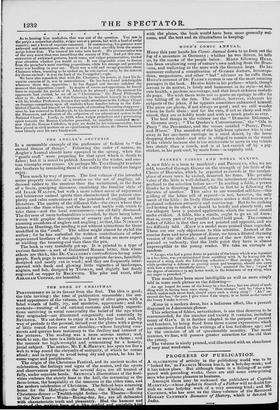PARKER'S FABLES AND MORAL MAXIMS.
A NEW fable is a boon to mankind ; and Paonieus, who, we are told, travelled through Greece on the strength of his fable of the Choice of Hercules, which he repeated to crowds in the market- place of every town he visited, deserved his fame. The peculiar value of the fable is well defined, in the introductory observations prefixed to the selection before us—" In reading a fable, a person thinks he is directing himself, while in fact he is following the dictates of another." This salve to our wounded self-love—this gilding of the bitter pill of reproof—is not, however, the only merit of the fable : its lively illustration makes a dull truism or a profound reflection attractive and convincing. But to be striking and lasting in its effect, it should be briefly and plainly told; and the allegory have a pointed application, which the moral should make evident. A fable, like a simile, ought to go an all fours; that is, every part of the parallel should hold good. The common defect of fables is that they are not pointed and apposite, and are too diffusely told. tEsop is a model more praised than regarded. These are our only objections to this selection. Instead of the concise form and terse phrase of 2E SOP, we have a diluted rhyming version of the old Greek ; and many of the new fables are ex- pressed so verbosely, that the little point they have is almost imperceptible to the young reader. We take an example at random.
" An ape, who had a great desire to partake of the honey which was deposited in a bee-hive, was yet intimidated from meddling with it, by having felt the smart of a sting, made the following reflection—' How strange that a bee, while producing a delicacy so passing sweet and tempting, should also carry with him a sting so dreadfully bitter." Yes,' answered the bee ; equal to the degree of sweetness in my better work, is the bitterness of my sting, when my anger is provoked.'"
This would have been more intelligible as well as more simply told in some such phrase as the following—
An ape longed for some of the honey in a bee-hive; but was afraid of med- dling with it, having been once stung. Ilow strange,' said he, that a bee, which makes such sweet food, should carry such a sharp sting !" Ah !' an- swered the bee, the pain I give when I am angry, is as bitter as the taste of the honey I make is sweet.'
A.:sop in a modern dress, has a ludicrous effect, like a proverb disguised in Johnsonian phrase. This selection of fables, nevertheless, is one that deserves to be recommended, for the number and variety it contains, including many of GAY'S. It is further adapted to the purpose of parents and teachers, by being freed from those coarse expressions which are sometimes found in the writings of a less fastidious age; and by the omission of all of questionable morality. The moral maxims, we fear, will possess greater attraction for the old than the young. The volume is nicely printed, and illustrated with an abundance of very neat wood-cuts.


























 Previous page
Previous page